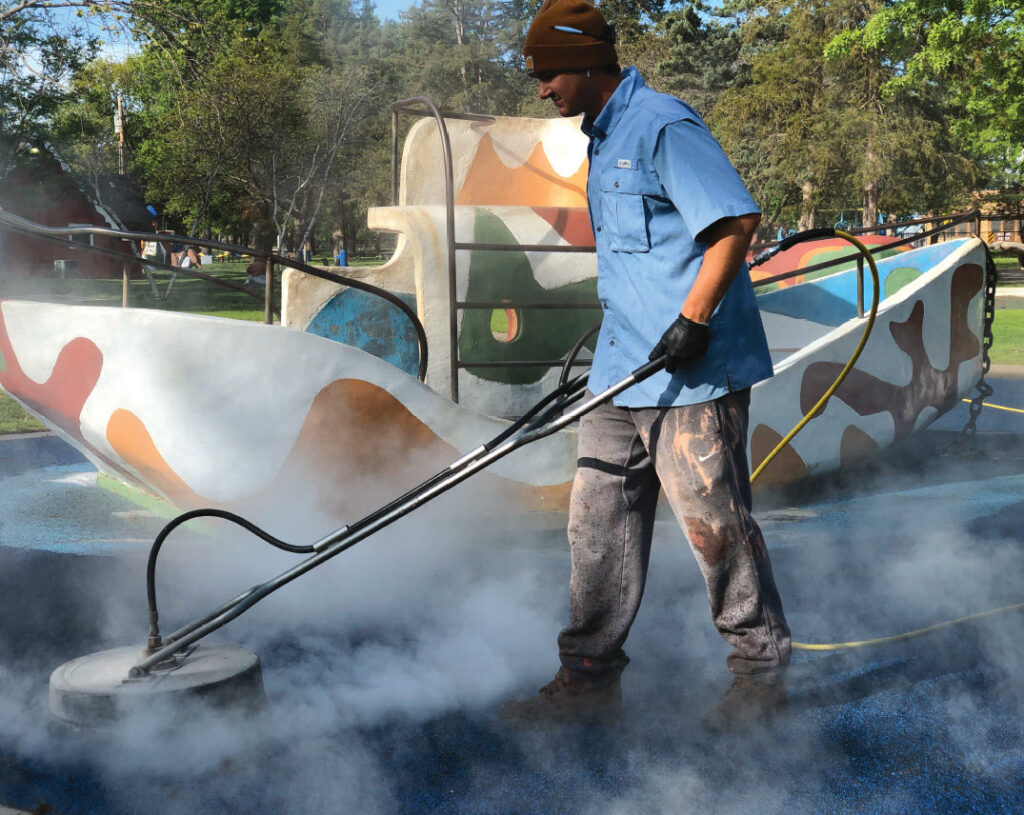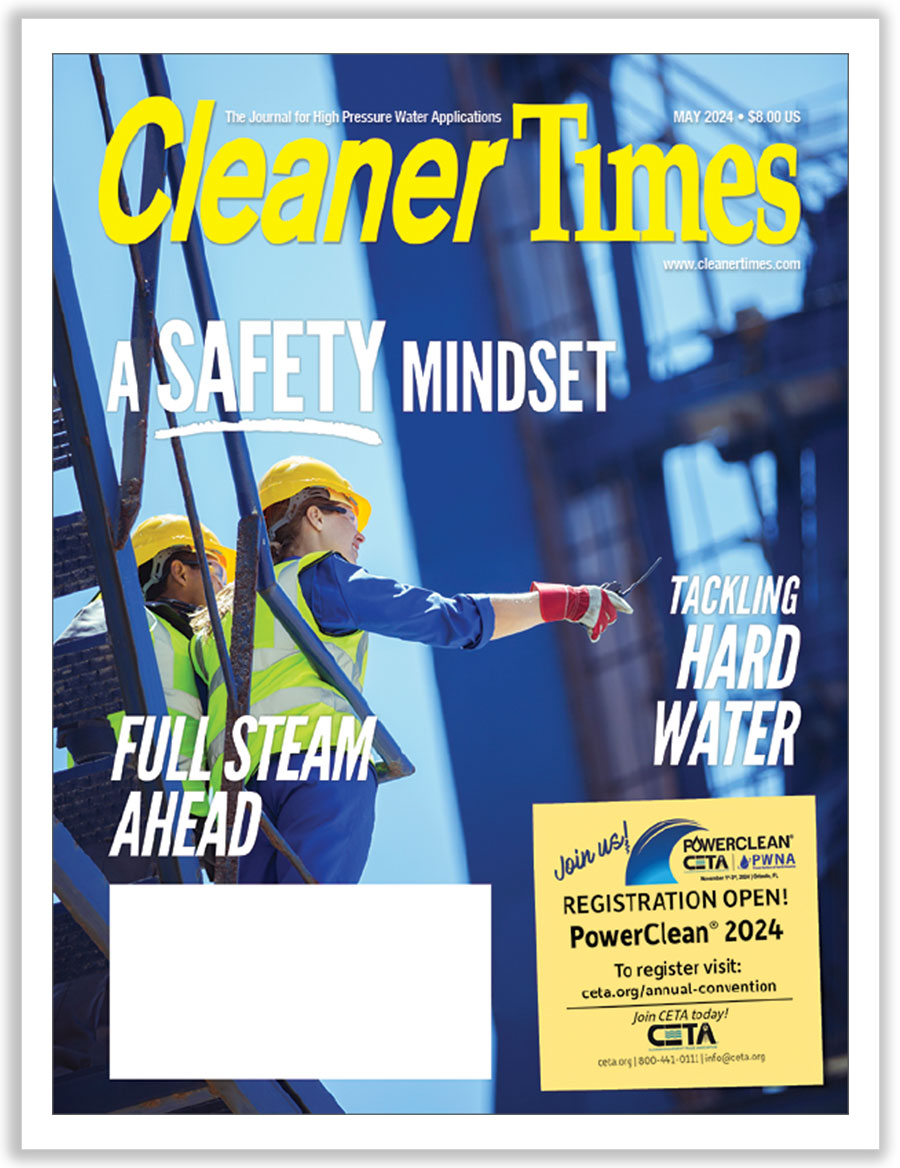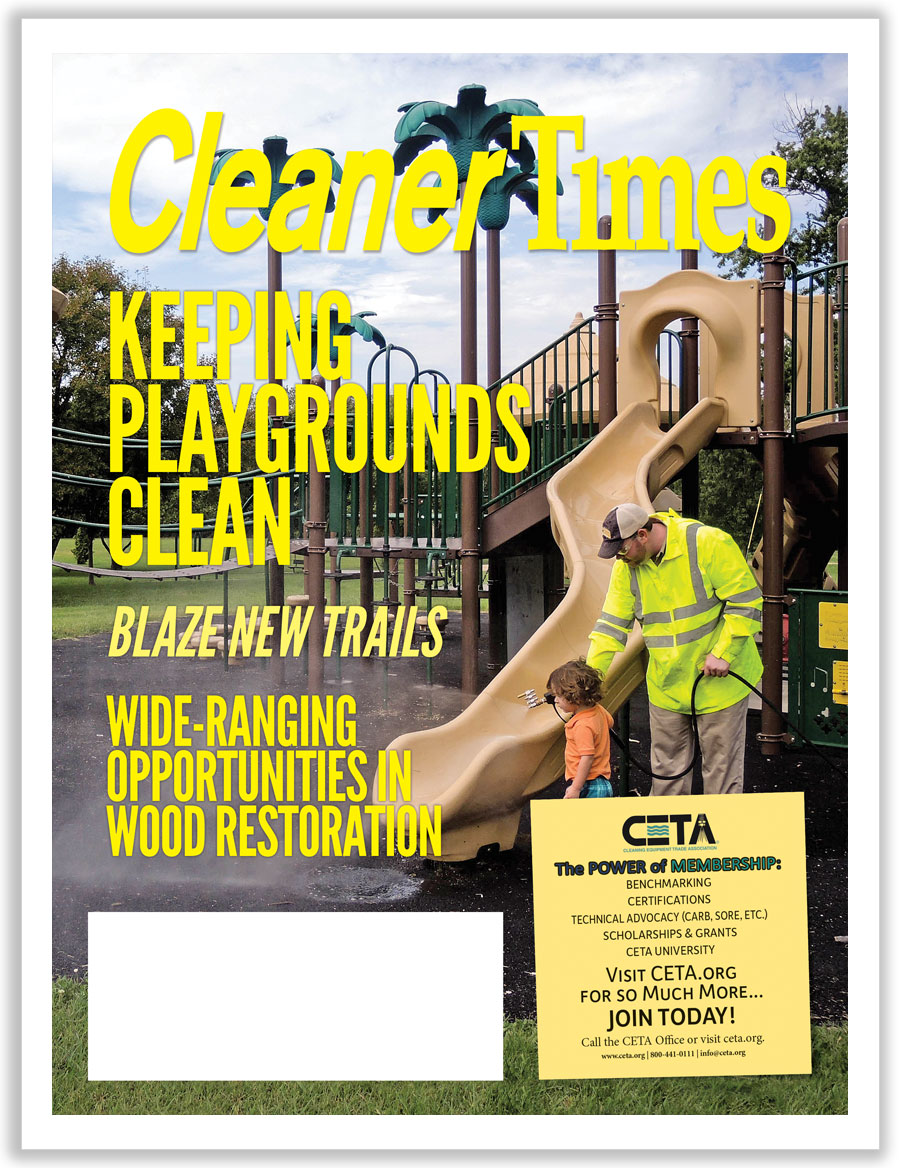
Power Washer’s Guidebook: Playgrounds And Water Slides, Part I
By Terri Perrin / Published March 2024

WHERE OTHERS PLAY, THERE ARE LUCRATIVE OPPORTUNITIES TO WORK
Editor’s Note: This chapter is a new addition to the Power Washers’ Guidebook.
Back in 2016 when Jake Taylor took his then seven- and three-year-old children to hang out at a community playground in Topeka, KS, he just wanted to take a break from work and hang out with his kids. It was his son, Alex, who looked at the dirty climbing structures, slides, and swings and asked, “Daddy, why don’t you clean the playground?”
“I was taken aback,” recalls Taylor. “Having started my company, Curb Appeal Power Wash, earlier that same year, I had focused on residential and commercial power washing contracts, adding in Christmas light installations and takedowns in 2021 to keep my team busy during the traditionally slower months. I had never even considered cleaning playgrounds as a potential revenue source.”
Taylor began researching cleaning outdoor playground equipment and waterslides. He discovered that this is a lucrative pressure washing opportunity.
GEOGRAPHICAL CONSIDERATIONS
Playgrounds can be found everywhere throughout North America in urban, rural, and even wilderness settings, such as state parks. The weather affects what type of grime build-up you will encounter.
“Black mold, mildew, and algae, for example, are more common in geographical regions with rainy or humid conditions,” explains Taylor. “In more densely populated areas, even smaller towns in high traffic areas, you will find air pollution residue. Graffiti artists who deface playgrounds, and birds that indiscriminately poop on things, are everywhere! But mostly what we see is the buildup of hand grime at high contact areas. Anywhere that kids touch needs to be addressed, as well as a buildup of dirt and boot scuff marks.”
Taylor also learned that the majority of playgrounds are never cleaned, with the playground owners leaving it up to Mother Nature’s rains to rinse away dirt. But we all know that Mother Nature is “all natural.” She doesn’t use detergents, degreasers, or disinfectants! While rain and snow may rinse away some dirt, it does nothing to address the issue of mycobacteria.

He also discovered that most playground stewards—be it the city, town, county, state, parks department, church group, community association, or school district—have unspent budgets for playground maintenance, and most are not aware that pressure washing can make them look as good as new and eliminate the bacteria. This is a huge factor because the cost to replace a playground is astronomical, with some costing hundreds of thousands of dollars to decommission old equipment and reconstruct something new. The budgets are there, and local contract cleaners need to be aware of this. Some homeowners also have backyard playgrounds that could benefit from a power wash.
Taylor spent a considerable amount of time looking for statistics to support his intuition that high surface touch points on playgrounds could be a cesspool of bacteria. There were not a lot of articles online at the time as to how to clean a playground and bacteria counts. Most organizations didn’t have protocols for cleaning frequency and standards, but what he did find was a study in Iowa that was startling. This confirmed what he suspected: it’s not necessarily only the neighborhood bully or a stranger at the playground that folks need to worry about for their kids’ safety. Harmful germs—such as those in the mucus that kids wipe from their noses— are there and can linger for days. (See graphic.)
“The Iowa research proved to me that some of the most harmful germs in any community are on outdoor playgrounds, even more than restrooms because restrooms get cleaned regularly,” adds Taylor. “Toddler areas are the worst.”
In another more recent study, HomeAdvisor.com tested commonly touched surfaces to find the number of colony-forming units (CFUs)— viable cells—per square inch. The HomeAdvisor study explained that “kids racing down the slide at an outdoor playground may actually encounter around 60,000 times more bacteria than they would at the top of the slide at the local fast-food joint or other indoor play area.”
Outdoor rock walls, baby swings, and seesaws were by far the germiest: All three teemed with 9 million CFU/ square inch, which is over 52,000 times more bacteria than a typical home toilet seat. Yikes! The slides, too, were crawling with germs. Both the top and the bottom of the slide average 6 million CFU/sq. in. On the low end, the monkey bars averaged 63,000 CFU/square inch, while tunnels had only 30,000 CFU/square inch. Big-kid swings had only 40 CFU/square inch. What is the good news for your children or grandchildren? Indoor playgrounds are not nearly as bad because they are cleaned and sanitized more regularly. (But parents and babysitters are still strongly advised to have children wash their hands after playing on any playground or waterslide.)
Taylor also did some testing of his own and was then able to use this data to help secure his first playground cleaning contract.
“Being new at this line of work, it took my team and I all day to complete the project. Once done, we were able to secure a contract to clean 52 playgrounds in our community. It has grown exponentially from there. Bear in mind that the cost of cleaning can be two to four percent, as compared to the cost of replacement, and it can be completed in a few hours, so this is excellent value for playground stewards. The playgrounds look new without the cost of installing a new one. At one playground we cleaned, the superintendent told me about an individual in the housing area who remarked, ‘It’s about time you got new equipment.’ This person didn’t believe it was the same playground … just clean!”
After that first contract, as the team got better and better at power washing play structures, Taylor wrote his own procedures manuals and made training videos for his team. This made a huge improvement in efficiency and results.
TYPICAL JOB
When it comes to outdoor playgrounds, there is no such thing as a “typical” job. Over the past couple of decades, playground equipment has been modernized to make it safer. Wood structures are being replaced with ones made of steel and plastic. Substrate/footing is changing from wood chips/mulch, gravel, and rubber pellets to colorful rubber matting/ surface pads, which may be safer but can get squishy, dirty, and smelly. (You need to clean the footing/ substrate as well as the play structure.) This evolution of playground construction is good news for kids and for pressure washers.

As for site accessibility, it is imperative that you visit the prospective project before providing a quote. “We had areas where we had to drive on grass to get close to the playground,” advises Taylor, “and other times when we require about 200 feet of hose to access the site. For this reason we always have at least 400 feet of hose on the trucks.”
Watch for parking lot curbs (you don’t want to get high-centered and stuck) and the tree canopy. Taylor says he prefers box trucks because they have more ground clearance, but then the tree canopy becomes a challenge. The driver needs to keep their eyes both on the ground and above for safety’s sake.
TECHNIQUES & EQUIPMENT
Are You Covered?—First and foremost, alert your insurance company to the fact that you are starting to clean playground equipment to ensure you are covered for this type of service.
Time of Day—Schedule playground projects for first thing in the morning so the park is less likely to have families playing there. Taylor stresses that this should always be (at least) a two-person job. One person is on the equipment, and the other acts as safety support to help untangle hoses from structures and to ensure kids stay well back from the area while work is underway. When you start putting what looks like a big bubble bath on their playground, the kids get excited.
Also, it is easy to get focused on cleaning and accidentally step/fall off the structure. Your “grounds person” should act as a safety spotter.
Park in areas that are very visible and put out pylons around the work area to create a boundary. Use a “No Parking Sign” near the truck and trailer unit.
Time of Year—Outdoor playgrounds are typically cleaned from late March to early April, depending on your region. In early May this may switch to pools and waterslides. If there is a budget for cleaning in place, and it’s not used, they lose it, so be sure to do regular checks with your customers to find out their budget cycles. State parks, for example, usually renew budgets on July 1. Once established you can get plenty of calls for state parks right before, or soon after, Independence Day.
Personal Protective Equipment— Supply your team with disposable rubber gloves—I prefer the Nitrile brand of gloves because they also offer protection from chemicals. Plus, you will need hard hats and slip-resistant waterproof boots as well as rain gear and waterproof gloves if it is early in the spring and the weather is chilly. If doing graffiti removal (with the need for stronger chemicals), provide a respiratory mask and safety glasses/face shield. Also, use ear plugs if using high pressure. The water sprayed against the plastic panels can be loud.

A Child’s Eye View—To thoroughly understand the scope of the cleaning project at hand, get down to a kids eye level to look at the underside of the equipment. There is often a buildup of black algae on the underside of play equipment because it doesn’t get sunshine. Wet algae are slippery, and when you apply the disinfectant, it gets slimy. Be careful!
Jake Taylor is the owner of Curb Appeal Power Wash, Topeka, KS. They focus on residential, commercial, and playground projects in Topeka and several other communities in their region. For more information, visit www.curbappealpowerwash.com.
HomeAdvisor.com powered by Angi is a nation-wide resource that connects individuals and businesses needing contract service with service providers in their area. www.homeadvisor.com





